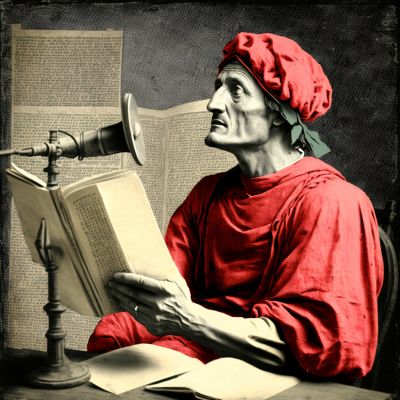This podcast is dedicated to English speakers who would like to know more about Italian Poetry, but don’t speak Italian. You can hear a summary of each poem in English, then the original in Italian, and you can also follow along on our website, where you’ll find resources to help find your way across languages.
https://italianpoetry.it/
episode 14: Cerchi chi vuol le pompe e gli alti onori, by Lorenzo de Medici
Today we read Cerchi chi vuol le pompe e gli alti onori, by Lorenzo de Medici.
Florence in the second half of the 1400s is one of those places where people would be tempted go, should time travel become available.
You could take a stroll around town and meet the likes of Leonardo da Vinci, Sandro Botticelli, Michelangelo, Marsilio Ficino, Pico della Mirandola, Poliziano: the quintessence of Italian Reinassance.
And at the center of it all, Lorenzo de Medici: de-facto ruler of Florence, a great magnate of the arts, and an artist himself. He is known as Lorenzo il Magnifico (the Magnificent) for a reason.
His most notorious poem is certainly the Canzona di Bacco (“The song of Bacchus”), a hymn to youth famously stating that di doman non c’è certezza (“there’s no certainty of tomorrow”). But here we reproduce a more sober sonnet.
Lorenzo laments all the headaches and worries that come with power and money. Whoever wants palaces and fame, have at it! I relax only in a nice little glade, with birds singing; or in a dark forest; where my duties don’t distract me from the contemplation of beauty and of my beloved.
Needless to say, these thoughts remained, shall we say, “on paper”, and he didn’t give up his power — quite the opposite…
The original:
Cerchi chi vuol le pompe e gli alti onori,Le piazze, i tempii e gli edifizi magni,
Le delizie, il tesor, quale accompagni
Mille duri pensier, mille dolori.
Un verde praticel pien di bei fiori,
Un rivolo che l’erba intorno bagni,
Un augelletto che d’amor si lagni,
Acqueta molto meglio i nostri ardori;
L’ombrose selve, i sassi e gli alti monti,
Gli antri oscuri, e le fere fuggitive,
Qualche leggiadra ninfa paurosa.
Quivi vegg’io con pensier vaghi e pronti
Le belle luci come fosser vive;
Qui me le toglie or una or altra cosa. \ The music in this episode is Monteverdi’s Toccata from Orfeo, played by The United States Army Old Guard Fife and Drum Corps (in the public domain).
